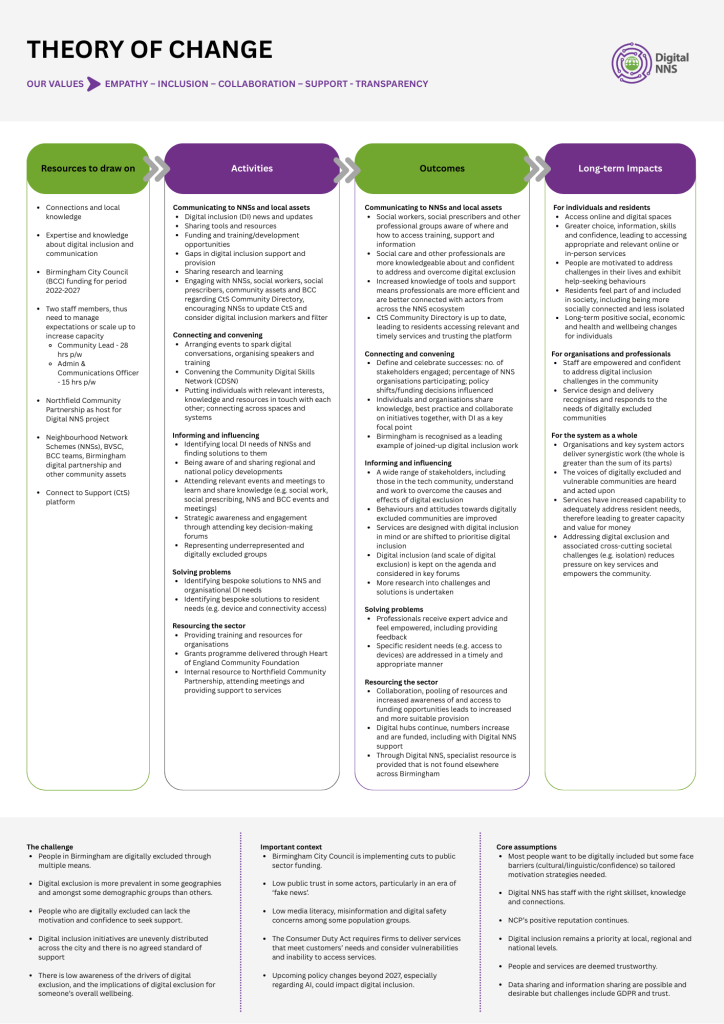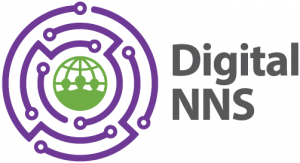
Our Theory of Change provides a roadmap of the work we do at Digital NNS and how it contributes to the long-term impacts that we aim to achieve in maximising opportunities for digital inclusion across Birmingham. We have broken it down into four components:
- Current resources that we can draw on
- Activities that we are already doing or plan to do
- Outcomes of these activities
- Desired long-term impacts
We have also set out the challenges, context that we work in, and the core assumptions behind our Theory of Change. These show why change is needed, highlight factors that may help or hinder progress, and how our work connects to the impact that we want to create.
Download the PDF for a more detailed version of our Theory of Change.
Digital NNS’s Theory of Change
Our values: Empathy – Inclusion – Collaboration – Support – Transparency
Resources to draw on
We benefit from strong connections and deep local knowledge, alongside expertise in digital inclusion and communication. Our work is funded by Birmingham City Council (BCC) from 2022–2027. We also have a dedicated team consisting of a Community Lead (28 hours per week) and an Admin & Communications Officer (15 hours per week), with the recognition that expectations must be managed or capacity increased to meet growing needs. Northfield Community Partnership (NCP) provides a trusted host organisation for the project, and we draw on the support and partnership of Neighbourhood Network Schemes, BVSC, BCC teams, the Birmingham Digital Partnership, and other community assets. We also make use of the Connect to Support Community Directory to promote digital inclusion services and activities across Birmingham.
Activities
Communicating to NNSs and local assets
We share updates, resources, and training opportunities, while identifying gaps in digital inclusion.
Through the Connect to Support Community Directory, we encourage NNSs to update and consider digital inclusion markers and filter.
Connecting and convening
We bring people together by arranging events and training, convening the Community Digital Skills Network, and connecting individuals with the interests, knowledge, and resources to support each other across spaces and systems.
Informing and Influencing
We support the NNSs by identifying local digital inclusion needs and work to find solutions, while staying connected to regional and national policy developments. By attending events, forums, and decision-making spaces, we share knowledge, influence strategy, and ensure the voices of underrepresented and digitally excluded groups are heard.
Solving problems
We identify bespoke solutions to NNS and organisational digital inclusion needs, as well as resident needs such as access to devices.
Resourcing the sector
We provide digital training and resources for organisations and deliver the Digital NNS Grants programme through the Heart of England Community Foundation. We also act as an internal resource to our host organisation NCP, attending meetings and providing digital inclusion support to services.
Outcomes
Communicating to NNSs and local assets
Social workers, social prescribers and other professional groups are aware of access to training, tools, and support, increasing their confidence and ability to address digital exclusion. With better knowledge and stronger connections across the NNS ecosystem, they can work more efficiently, while an up-to-date Connect to Support Community Directory becomes a trusted platform where residents can access relevant and timely services.
Connecting and convening
Success is measured through stakeholder engagement, NNS participation, and the influence of policy and funding decisions. By sharing knowledge, best practice, and collaborating on initiatives, digital inclusion becomes a central focus, positioning Birmingham as a leading example of joined-up action.
Informing and Influencing
A broad range of stakeholders, including the tech community, are engaged in tackling digital exclusion, while behaviours and attitudes towards digitally excluded communities are improved. Services are increasingly designed with digital inclusion in mind, the issue remains a priority in key forums, and more research is carried out to understand challenges and solutions.
Solving problems
Professionals receive expert guidance and feel empowered, while specific resident needs are addressed promptly and appropriately.
Resourcing the sector
Collaboration and pooling of resources leads to increased access to funding opportunities and provision, Digital Hubs continue to expand including with Digital NNS support, and specialist resources are provided through Digital NNS.
Long-term Impacts
For individuals and residents
Individuals and residents gain digital skills and confidence, are able to access relevant services, feel socially included, and experience long-term positive social, economic, and health outcomes.
For organisations and professionals
Staff are empowered to address digital inclusion challenges in the community, and services are designed to meet the needs of digitally excluded communities.
For the system as a whole
Organisations and key system actors collaborate effectively, ensuring greater collective impact. The voices of digitally excluded and vulnerable communities are heard and acted upon, and services become more responsive, efficient, and valuable. Addressing digital exclusion and related societal challenges, such as isolation, reduces pressure on key services and empowers communities.
Challenges, context, and core assumptions behind our Theory of Change
The Challenge
Levels of digital exclusion in Birmingham varies across areas and groups, with many digitally-excluded people lacking motivation or confidence to seek support. Initiatives are unevenly distributed, standards of support are inconsistent, and awareness of the causes and impacts of digital exclusion is low.
Important Context
Birmingham faces public sector funding cuts. There is also low trust in certain actors, low media literacy, misinformation, and digital safety concerns among some population groups. Regulatory frameworks, such as the Consumer Duty Act, require services to meet customer needs and consider vulnerabilities and inability to access to digital services. Additionally, upcoming policy changes beyond 2027, particularly relating to AI, could further impact digital inclusion across the city.
Core assumptions
Most people want to be digitally included but face barriers such as language, culture, and confidence, which would require tailored support. Digital NNS has skilled staff and strong connections, NCP maintains a positive reputation, and digital inclusion remains a local, regional, and national priority. People and services are deemed trustworthy, and data and information sharing are wanted though challenges like GDPR and trust persist.
